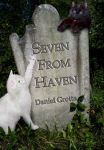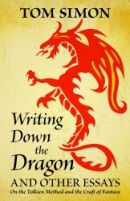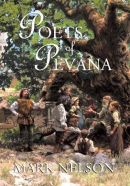2Q 2013 Small Press Book Reviews (original) (raw)
Abyss & Apex 2Q 2013 Small Press Book Reviews
by C.N. Lesley (Kristell Ink)
Despite the cover this is not yet another book about magic and dragons. It is about a young woman’s journey of self-discovery. On par with the lowly Wart of Arthurian legend, fifteen-year-old Raven starts out as a foundling, a servant, bound by love to the only mother she knows. She serves a small-time practitioner and healer in a small village where she does not belong and feels an outcast, as her coloration marks her ancestry from one of the wandering tribes to the north. When her adoptive mother sheds years of lies and hiding to claim her rightful place near royalty, Raven’s life—already tinged by forbidden magical abilities—becomes more and more constrained. Threatened by intrigues she had no part in, Raven barely escapes to her beloved forest with her life.
Members of the northern tribes find her, save her. She tries to make a home with various segments of that society, never quite fitting in but learning much. One of them betrays her back to the southern kingdom, whose ruler needs her to die to cover his intrigues.
In all of these situations she fears, above all else, the wyvern: the four-legged dragons of legend that permeate her past and future scrying and – and her nightmares.
How she, a small firedrake, a man of a race called Drakken (who are friendly with the wyvern), and some wyvern half-breeds await an opportunity for escape and new life is so full of twists, misunderstandings, betrayals, revelations, romance, battle and magic is for you to discover if you read this marvelous book. And by magic, I mean the kind of enveloping world-building and characterization that can cause you to look up hour later and only then notice that while you were immersed in the book the sun has set and you’ve missed a meal. Or two.
C.N. Lesley leaves things open for a sequel, and one hopes to read it soon.
Seven From Haven
by Daniel Grotta (Pixel Hall Press)
Those of you addicted to adrenaline and sex mixed with the paranormal might want to skip this book. True, it has tales of mindless grief, a gruesome motorcycle accident, a man pressed into bloody, desperate emergency surgery, senseless violence and echoes of the Holocaust, but these things are mostly transformed into wisdom. If the writers of Murder, She Wrote did a paranormal series, it would resemble this charming book about a rural hamlet in the Pocono Mountains of Pennsylvania.
We meet, in seven longish short stories, unexplained phenomena such as people from a bygone era coming out to help a man in grief and a woman in labor, a man who “died of empathy” whose unexpected legacy lives on, roads and car troubles that will not let guilty criminals get away, and a cemetery that thanks people for being a good neighbor.
You know that feeling you get after watching “It’s A Wonderful Life”? When I finished reading this I had to wipe a tear away, and sighed, “That was wonderful.” If you prefer your ghosts as friendly, protective spirits, this book is for you. The Village of Haven does, indeed, look after its own.
Writing Down the Dragon
by Tom Simon (Bondwine Books)
This book of erudite essays is not for everyone. But Tolkien admirers and Tolkien scholars alike will find this non-fiction book examining J.R.R. Tolkien’s writing techniques not just fascinating, but bordering on a feast. It’s a work of scholarship and genius, with much to recommend it to any fantasy author wishing to take apart a master fantasist’s works and see what makes his stories tick.
Oddly enough, it starts out by taking Tolkien at his word when he says that The Lord of the Rings arose from his invented languages. We are then taken on a short but thorough and enthralling side-tour of modern literary criticism forms so we can be told, “No, don’t read such things into his work.”
Then Tolkien’s true influences shine forth. Here we have a discussion of Tolkien’s polylingual background which led to his intentional use of different voices for various races. There we see revealed the myths that are the crux of ancient languages that he mingled in unusual ways (there’s a pattern). Tolkien’s influences from not only his philological background and his chosen Catholicism and, indeed, all of Western thought are laid bare. The lineage, rationale and Tolkien’s documented and extrapolated thought processes behind his creation of orcs, elves, dwarves, dragons and Rings are revealed in insights of unexpected splendor.
Not all of the author’s comments are glowing. Much is made—and rightfully so—about Tolkien’s inability to finish the Lost Tales or The Silmarillion. There, too, are lessons to be learned by example. The reasons Tolkien was sidetracked were only partly known to this reviewer, and I learned from them. These insights may also prove very useful and instructive to novice through experienced writers.
Finally, after a rather thorough bibliography, quotes in the book are sourced. References are located in the back in a way that takes into account the vagaries of ebooks and their lack of page-numbering. This is good, as Writing Down the Dragon is a work to be re-read and studied.
Much of the information in this book was new to me and—as an avid Tolkien reader—I will guard it in my heart as jealously as any dragon’s hoard. Tom Simon’s words, and insights, shine like gold.
The Poets of Pevana
by Mark Nelson (Hadley Rille Books)
To be honest, at first the opening section with the maunderings of a lovelorn, poetry-spouting, unemployed, disinherited fool–who was pining away for a married woman no less–did not appeal to me. But the preface hinted that Taylior had been struck by a divine arrow and was in the hands of fate. I continued to read.
I was very glad I did. For there were two more poets and two others struck by the same arrows, and everything that happened to them tied together in an adventure I shall not soon forget. A prince who had forgotten to rule was in danger of being overcome by a state religion that had forgotten to care, and the fate of people of Pevana hung in the balance, until the gods of Pevana’s Old Ways tipped the scales. And the fulcrum was their traditionally revered poets, speaking truth.
One thing I found refreshing about this novel was that it hit a grace note regarding a pet peeve of mine. This reviewer has seen the “evil and insincere religious-types smother the populace” trope done to death. Not so here. The Poets of Pevana does feature some scheming people within a state religion – people doing things to enhance their personal power, but it is all laid out in a believable way. Another bête noir in fantasy books with a “long ago and far away” setting is feminist elements thrown as indigestible lumps: instead, Poets of Pevana also has a rather feminist twist that that is integral to the story. And in the end, everyone has changed and grown, and justice at least has a fair chance.
A very, very satisfying book. I look forward to reading the sequel, Kings Gambit, which I understand is coming out very soon.



